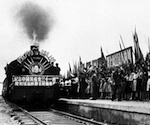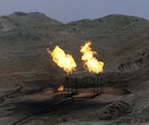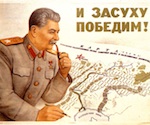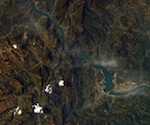





Participants
Sunil Amrith is a Reader in Modern Asian History at Birkbeck College, University of London. His research focuses on the trans-regional movement of people, ideas, and institutions, and it has encompassed the history of public health, the history of migration, and environmental history. His most recent work has been on the Bay of Bengal as a region connecting South and Southeast Asia. He has a PhD in History (2005) from the University of Cambridge, where he was also a Research Fellow of Trinity College (2004-6).
Sara Brinegar is a Ph.D. candidate at the University of Wisconsin-Madison in the Department of History. Her dissertation, titled "Baku at All Costs: The Politics of Oil in the New Soviet State" explores the role that the development and exploitation of oil had in the formation of the Soviet Union and how the rapidly growing industry shaped domestic and foreign policy decisions, with particular reference to Azerbaijan.
Maitreyee Choudhury, M.A., Ph.D. in Geography (University of Calcutta) teaches at the Centre for Himalayan Studies, North Bengal University, Dist. Darjeeling, WB, India. She is a member of the Expert Appraisal Committee, River Valley and Hydroelectric Projects, Ministry of Environment and Forests, Govt. of India. She has completed one major and several minor research projects, and published many research papers, and edited several books and journals. She has traveled widely and was a visiting Professor at the Department of Geography, Lille University, France, in 2010. She takes special interest in Himalayan Studies and hydroelectric projects.
John DiMoia is an Assistant Professor in History at the National University of Singapore (NUS), where he teaches classes focusing on (1) the history of technology (esp. EA, 18th century-present), (2) the history of medicine (18th century-present), and (3) Modern Korea (mid-19th century-present). He is the author of the forthcoming Reconstructing Bodies: Biomedicine, Health, and Nation-Building in South Korea since 1945 (Stanford UP, 2013 / Columbia UP WEAI). He is currently working on two new projects: the first a book on energy issues in NE Asia and the Korean peninsula, centering in particular on the decision by South Korea to "go nuclear" in the late 1960s; and the second, a history of North Korean propaganda, the images these materials help to craft both domestically and internationally, and the historical understanding of that nation from an international perspective.
Eric Dinmore is Assistant Professor of History at Hampden-Sydney College and in 2011-12 he was a postdoctoral fellow at the Reischauer Institute of Japanese Studies. His most recent publication is "Concrete Results? The TVA and the Appeal of Large Dams in Occupation-Era Japan," The Journal of Japanese Studies, 39:1 (Winter 2013): 1-38.
Har Ye Kan is a research associate and post-doctoral fellow at the Harvard University Graduate School of Design. She received her B.A. (Hons) in Geography from the University of Cambridge, as well as an A.M. in Regional Studies-East Asia, and a D.Des from Harvard University.
Judd Kinzley an assistant professor of Modern Chinese History at the University of Wisconsin Madison and holds a Ph.D. from the University of California, San Diego. His dissertation, which he completed in 2012 with help from a Fulbright Hays Doctoral Dissertation Research Award and awards from the Association of Asian Studies and the All-California Group in Economic History, is titled "Staking Claims to China's Borderland: Oil, Ores and State Building in Xinjiang Province, 1893-1964." This work, which he is currently in the process of revising for publication, is focused on the often overlooked connection that exists between natural resources and state- and nation-building in China's peripheral regions during the twentieth century.
Shi-Lin Loh is a Ph.D. candidate in Modern Japanese History at Harvard University, jointly affiliated with the Department of East Asian Languages and Civilizations and the Department of History. She is also pursuing a secondary field in Science and Technology Studies. Her current work is on a dissertation that is presently envisioned as a synthetic history of the nuclear age in twentieth-century Japan, focusing on the changing trajectories of nuclear science in the public domain. Born and raised in Singapore, her other research interests include modern Chinese history, the cultural politics of commemorating the atomic bombings in Japan, and issues in gender and literary studies.
John McNeill, University Professor, Georgetown University, was born and raised in Chicago and remains passionately devoted to the professional sports teams of the Windy City. He earned, or at any rate was awarded, a B.A. from Swarthmore College and a Ph.D. from Duke University. Since 1985 he has cheerfully served two masters, as a faculty member of the School of Foreign Service and History Department at Georgetown. From 2003 until 2006 he held the Cinco Hermanos Chair in Environmental and International Affairs, until his appointment as University Professor. He teaches world history, environmental history, and international history at Georgetown; and writes books, and directs Ph.D. students, mainly in environmental history.
Ian Matthew Miller is a doctoral candidate in History and East Asian Languages at Harvard University. His dissertation research addresses changes in non-agrarian, mountain land in early modern South China, with particular focus on the changes in state and lineage institutions aimed at managing tomb sites and forest resources. Ian will continue on-site research in eastern Jiangxi Province this upcoming academic year.
Ian Jared Miller teaches Japanese history at Harvard University. He is the author of The Nature of the Beasts: Empire and Exhibition at the Tokyo Imperial Zoo (University of California Press, 2013) and co-editor with Julia Adeney Thomas and Brett L. Walker of Japan at Nature's Edge: The Environmental Context of a Global Power (University of Hawaii Press, 2013). He is writing a book about Tokyo in the age of global energy.
Anto Mohsin earned bachelor's and master's degrees from the City College of New York in Mechanical Engineering. Afterwards, he interned and subsequently worked as a mechanical design engineer for GE Power Systems, which later changed its name to GE Energy, in Schenectady, NY and Houston, TX. He started his graduate study in Cornell University's Science and Technology Studies Department in Fall 2007 under the mentorship of Professors Ronald Kline, Sara B. Pritchard, Trevor Pinch, and Tamara Loos. He just came back from fieldwork and is currently writing his dissertation, which examines the intertwining relationships among ideology, technology, politics, and national identity in a postcolonial country, specifically during Indonesia's New Order period.
Micah Muscolino's area of expertise is the environmental history of late imperial and modern China. He teaches undergraduate courses on Global Environmental History, Chinese Environmental History, Modern World History, and the Pacific World. He also teaches a graduate class on China in World History and a research seminar on topics in East Asian History. Before coming to Georgetown he taught for two years at Saint Mary's College of California, where he offered classes on Chinese History, East Asian History, and World History. He spent 2010-2011 as a member of the School of Historical Studies at the Institute for Advanced Study in Princeton, NJ with support from a Mellon Fellowship for Assistant Professors. He has also been awarded fellowships and grants from Fulbright (IIE), the Center for Chinese Studies at the National Central Library in Taiwan, and the Chiang Ching-kuo Foundation.
Maya Peterson is an assistant professor of history at the University of California at Santa Cruz. She teaches courses on the history of Russia and the Soviet Union, the Silk Roads, environmental history and comparative empire. She received her Ph.D. from Harvard University in 2011, with a dissertation entitled "Technologies of Rule: Empire, Water, and the Modernization of Central Asia, 1867-1941." The book she is working on, based on the dissertation, examines tsarist and Bolshevik efforts to irrigate the Central Asian borderlands and how such hydraulic engineering projects reflected imperial and Soviet notions of civilization and progress, as well as Russia's quest to be a European empire in the heart of Asia. In 2013 she will spend six months in residence as a Carson Fellow at the Rachel Carson Center for Environment and Society at the Ludwig-Maximilians-Universität in Munich, Germany.
Emma Rothschild is Jeremy and Jane Knowles Professor of History at Harvard University, Director of the Joint Centre for History and Economics, and Honorary Professor of History and Economics at the University of Cambridge. She is a fellow of Magdalene College, Cambridge. She graduated from Oxford University in 1967, and was a Kennedy Scholar in Economics at MIT. From 1978 to 1988, she was an Associate Professor at MIT in the Department of Humanities and the Program on Science, Technology, and Society. She has also taught at the Ecole des Hautes Etudes en Sciences Sociales in Paris. She has written extensively on economic history and the history of economic thought. Economic Sentiments: Adam Smith, Condorcet and the Enlightenment was published in 2001 by Harvard University Press. The Inner Life of Empires: An Eighteenth-Century History was published by Princeton University Press in 2011.
Jin Sato is Associate Professor at the Institute for Advanced Studies on Asia at the University of Tokyo. He focuses on natural resource governance, foreign aid, and disaster response with a geographical emphasis on Southeast Asia and Japan. His most recent co-edited book is The Rise of Asian Donors: Japan's Impact on the Evolution of Emerging Donors (Routledge, 2012). He has published in journals such as World Development, Sustainability Science, Development and Change, Development in Practice, and Journal of Southeast Asian Studies.
Victor Seow is a historian of modern China with research interests in issues of energy, science and technology, the environment, business and labor, and state power. His dissertation, "Coal Capital: Manchurian Energy Regimes and the Industrial Modern, 1907-1957," examines the rise of the fossil fuel industry in northeast China and the relationship between energy and global industrial modernity. He received his B.A. from McGill University in 2006, is completing his Ph.D. at Harvard University, and will be joining the Department of History at Cornell University as Assistant Professor of Modern Chinese History in 2014.
Daqing Yang is Associate Professor of History and International Affairs at the George Washington University, where he teaches modern Japanese and East Asian history. A native of China, Professor Yang graduated from Nanjing University and received his Ph.D. from Harvard University. Professor Yang is a recipient of fellowships from the SSRC, NEH, Japan Foundation, and the Northeast Asian History Foundation. His research interests include the Japanese empire, World War II as well as the history of technology. His book, Technology of Empire: Telecommunications and Japanese Expansion in Asia, 1883-1945, was published in 2011. Among his co-edited books is Communication under the Seas: The Evolving Cable Network and Its Implications (2009).
Ling Zhang is an Assistant Professor in History Department at Boston College. She gained her doctorate from Cambridge University, and was a Ziff Environmental Fellow in the Center for the Environment at Harvard University and a postdoctoral fellow in the Program of Agrarian Studies at Yale University. She is a historian for middle-period China and Chinese environmental history. She has finished a book manuscript entitled The River, the Plain, and the State: Making a Yellow River Delta, 1048-1128, and is working on a new project, 'China's Sorrow or the Yellow River's Sorrow? An Environmental History of the Yellow River'.